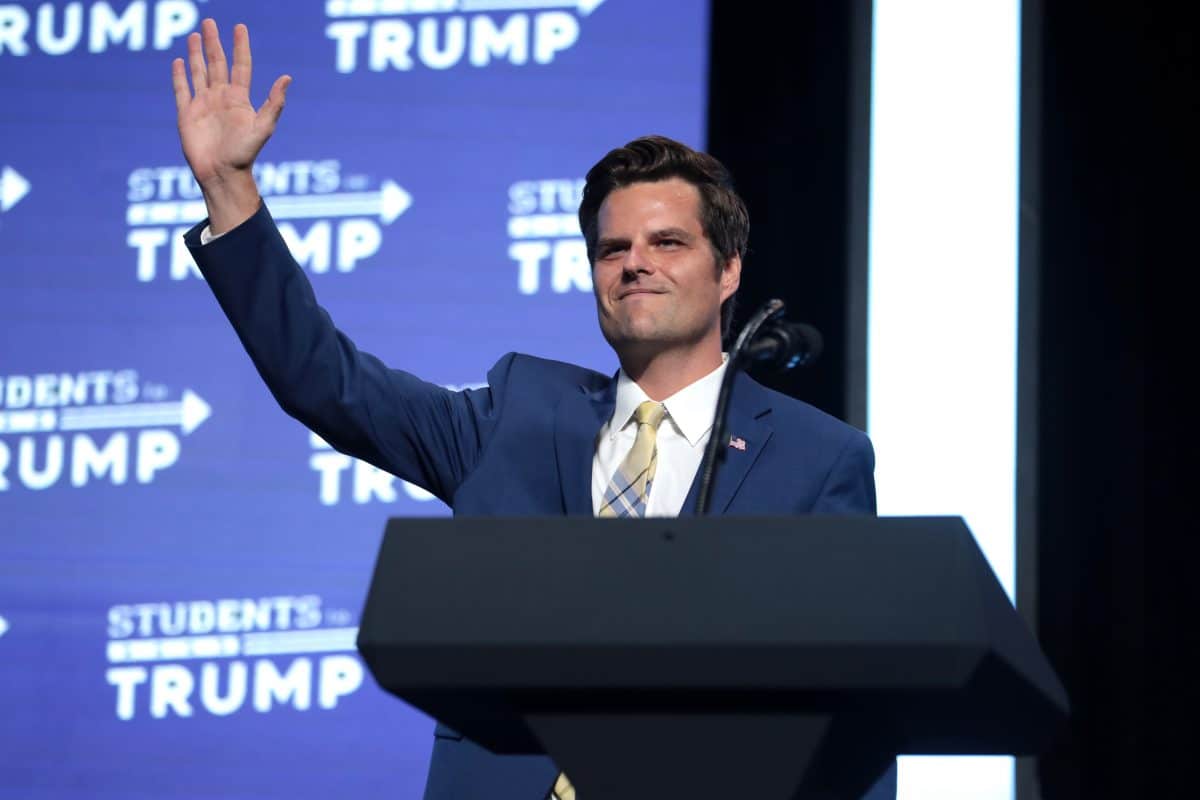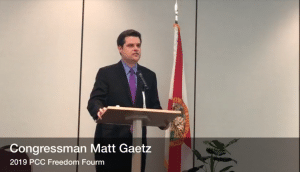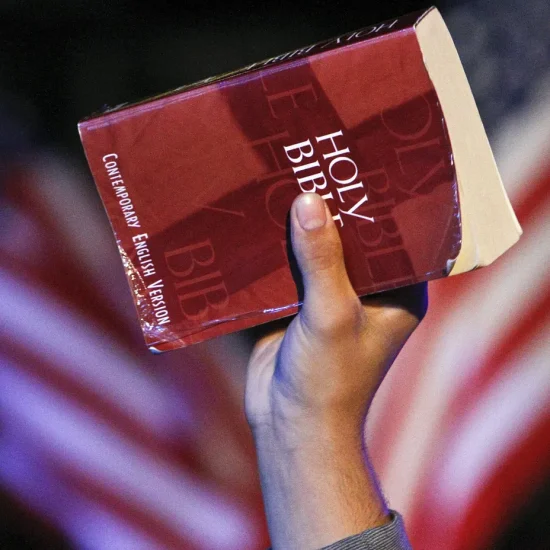
Note: This bonus issue of A Public Witness is available for everyone to read. If you are not a paid subscriber to APW, you missed last Thursday’s issue on masks and individualism, and you will miss this Thursday’s issue on “cancel culture” that will be sent just to paid subscribers. But you can subscribe today to read the archives and receive all future issues. Please also feel free to share this issue with others you think would like to read it.
Pensacola Christian College has a very strict code of conduct. Students are expected to “exercise control over their emotions and desires so that behavior is appropriate and right.” They are prohibited from possessing pornography, engaging in sex outside of marriage, and using drugs. Furthermore, “to guard purity and maintain a spotless Christian testimony,” men and women are not allowed to make physical contact with each other, be in secluded places together, or even ride in the same elevator.
The school is represented in Congress by Rep. Matt Gaetz, and some of its students have interned and worked for him. In a 2019 appearance at a student-led “Freedom Forum” on campus, the congressman said “we want to show people that they want to get in on all the goodness that comes with being a Christian — all the happiness, all the joy, all the fulfillment you get from serving the Lord. Try to be that same light in the service of our values and in our beliefs.”
Gaetz seems to have fallen short of this goal and broken all of Pensacola Christian College’s rules along the way. He reportedly bragged to other members of Congress about his sexual escapades, including sharing pictures and videos of naked women. He allegedly paid for sex on multiple occasions, and witnesses claim he used illegal drugs while partying with those “escorts.” The most horrific claims surround the trafficking and improper relationship with a minor, to which an associate has already pled guilty and indicated a desire to cooperate with federal investigators. Gaetz’s ex-girlfriend is also telling investigators what she knows.
The congressman has denied any wrongdoing, recently telling a group of Ohio Republicans that “I’m being falsely accused of exchanging money for naughty favors.” Ignoring calls to resign, he instead plays the victim card.

Screengrab of Rep. Matt Gaetz speaking at Pensacola Christian College in 2019.
Gaetz has been the recipient of a lot of media attention. He is prominently featured in an HBO-documentary, called “The Swamp,” that offers a behind-the-scenes look at the operations of Congress. Other, less flattering, profiles have documented his political rise and unyielding embrace of former President Trump, his transformation from a backbencher to a partisan warrior, and his connection to that corrupt county tax collector who apparently has turned against him.
What nobody has explored in great detail is Matt Gaetz’s connections to the Religious Right, those individuals and institutions that vociferously promote a set of values that the congressman from Florida seems to flout. Also unnoticed is his embrace of Christian Nationalism, the problematic ideology that Christians deserve a privileged and protected place within American society.
In this issue of A Public Witness, we’ll look beyond the headlines to the theological concerns at play in this ongoing morality tale. While Gaetz’s behavior may pose legal troubles for him, it proves embarrassing to a religious movement whose claims ring hollow when championed by such a loud, flawed messenger. Worse yet, his views are emblematic of a dangerous belief system rampaging through the country and its churches.
A Baptist in Name Only?
Gaetz has described himself as “an active member” at First Baptist Church in Fort Walton Beach, Florida, making him one of 20 Southern Baptists in the current Congress. On a voter guide survey, he referenced being saved as a teenager and detailed his beliefs as: “The Bible. The Gospels — these are our instructions from God. We are to follow faithfully.”
On the surface, he checks all the boxes of evangelical Christianity in America: an experience of personal conversion, church membership, and extolling the Bible as divinely inspired and authoritative for one’s life.
Yet, there were some warning signs. The first is Gaetz’s own description of the Bible, which he sees as more of an instruction manual to read and follow than a sacred text that allows one to experience a deep relationship with God. Christian leaders often critique this way of approaching scripture. Instruction manuals are consulted when you need directions or something breaks. Otherwise, they stay on the shelf. For devout Christians, the Bible is regularly read for one’s own edification and to foster a connection with the God made known in Jesus Christ.
This suspicion about Gaetz’s choice of words might seem overblown until you consider how cavalierly he dismisses the allegations of sexual impropriety by downplaying his vocation. As reports about his behavior started emerging, Gaetz wrote last month, “I am a representative in Congress, not a monk, and certainly not a criminal.”
These remarks are a far cry from his earlier claim that Christians in general, not just monks, are to follow the Bible faithfully. Indeed, in his 2020 book he lauded then-President Trump for altering the moral expectations the public holds towards politicians.
“But we’ve got a president now who doesn’t care for puritanical grandstanding or moralistic preening,” Gaetz wrote. “I have an active social life, and it’s probably easier in the era of Trump. … If politicians’ family lives aren’t what really matter to the voters, maybe that’s a good thing.”

Rep. Matt Gaetz speaking at a Trump campaign event in June 2020. (Gage Skidmore/Creative Commons)
Looking at the other ways Gaetz talks about the role of religion in public life raises more questions. His rhetoric ranges from using God as a partisan prop to an awkward unfamiliarity with Christian teachings to promoting an ahistorical Christian Nationalism.
As a member of the Florida Legislature, he pushed a law allowing the open carry of guns. To Gaetz, gun ownership was a right “granted not by government but by God.” To state the obvious, scripture is silent on firearms. Humans did not start using guns until the 14th century. There is nothing in the 10 commandments, the Gospels, or any other part of the Bible that could be honestly construed as establishing a God-given right to own or carry a gun. When people talk about their “2nd Amendment rights,” they are referencing the founding document of a government and not holy writ. Here Gaetz was either confused or intentionally using God as a tool for achieving a very human end.
Later, as a congressman attacking the FBI for investigating then-President Trump, Gaetz went on CNN and made a reference to “the Immaculate Conception.” This theological doctrine holds that Mary, the mother of Jesus, was born free of original sin. Despite having brought up the teaching, Gaetz did not grasp that it was only indirectly about Jesus and found himself confused while live on TV.
Whatever the congressman’s struggles in explaining tenets of the Christian faith, he has been much more comfortable articulating a worldview rooted in Christian Nationalism. This ideology, as noted above, inaccurately portrays the United States as “a Christian nation,” based on a mythical understanding of the country’s founding, and thus a place where Christians deserve special rights and a privileged status.
Gaetz evinced these beliefs on a survey compiled and distributed by AFA Action (the political arm of the conservative Christian group the American Family Association) and other Religious Right partners like Reclaiming Florida for Christ. His responses assured voters that he believed “Judeo-Christian values established a framework of morality which permitted our system of limited government.” And he proceeded to rank “God” above the Constitution as a source of authority for the country. The latter view would likely surprise the document’s author, James Madison, who wrote it without including a single reference to the Divine.
Gaetz waded further into these waters during his congressional campaign in 2016, penning a column defending the legality of a cross erected decades ago on public land for the specific purpose of Easter worship.
“Our country will always be friendly to the cross,” Gaetz added. “We need leadership in Washington that understands America is a Christian nation founded on Christian values.”
Thus, he claimed the need “to take the fight to Washington to restore America.” But rather than restoration, such rhetoric envisions a remaking of the U.S. and the Christian faith that problematically merges the two.
Neither of us have talked with Matt Gaetz about his faith. His office did not respond when asked for comment for this piece. Our analysis is limited to what is available in the public record. Furthermore, Article VI of the Constitution explicitly states that “no religious test shall ever be required as a qualification to any office or public trust under the United States.” Our concern is that Gaetz’s statements and activities reveal a narrow understanding of American identity that seeks to exclude others based on a distorted version of Christianity (that, by the way, neither fosters religious devotion nor is correlated with religious belonging.)
These awkward and confused religious expressions by Gaetz reflect larger trends in American Christianity and politics. The congressman was first elected to federal office in 2016 alongside Donald Trump, whose own religious life has been called “opaque” but was overtly celebrated by those with Christian Nationalistic beliefs. Given Gaetz’s bombastic support of Trump, it came as no surprise to us that on Jan. 6, just hours after a pro-Trump mob waving Christian flags and others signs reflecting Christian Nationalism stormed the U.S. Capitol, the congressman took to the floor of the House to spread inaccuracies about the election being stolen and antifa preposterously leading the insurrection.
Gaetz was the perfect candidate for success at this moment. He represents a particular brand of Trumpian politics and nationalistic Christianity that are volatile when mixed. Now, as personal scandals threaten to derail his meteoric rise, he presents conservative Christian leaders with a test of whether politics trump faith.

(Julio Cortez/Associated Press)
Get cutting edge analysis and commentary like this in your inbox every week by subscribing today!
Gaetz & the Christian Right
In 2018, GQ deemed Gaetz “the Trumpiest congressman.” While he has proven to be a right-wing provocateur, he has invested little effort, once in Washington, in engaging leaders and audiences among the so-called Religious Right. Thus, when Christian conservatives have embraced Gaetz it appears to be more about his Trumpian politics than his limited, awkward faith declarations.
Consider, for example, Tony Perkins and the Family Research Council. Perkins hosted Gaetz on his radio show, “Washington Watch,” to highlight the congressman’s opposition (misguided in our view) to the FBI working with the Southern Poverty Law Center, a civil rights group known for its efforts exposing and classifying hate groups and extremists. FRC Action, the legislative arm of Perkin’s network, bestowed their “true blue” award on Gaetz in 2018 for his perfect voting record on legislation they tracked and sent out a laudatory press release accompanying the award.
Perhaps the bigger story is not the lack of interaction between Gaetz and the Christian Right but the silence of the movement’s leaders with all the news emerging about the congressman’s misdeeds. Roland Martin, a journalist and faith leader, recently called out by name a group of White evangelicals during an appearance on MSNBC and asked, “How are you saying nothing?” He pointed out that their respective quietness on Gaetz stood in stark contrast to their public condemnations of Democratic members of Congress previously mired in scandals.
Peter Wehner, a conservative Christian who worked at senior levels of the George W. Bush White House similarly noted in an interview about the Christian Right’s response to the Gaetz scandal that “there’s the issue of Christian voters and public voices who use a completely different moral standard when it comes to Democrats and Republicans.”
This accountability gap is especially noticeable among prominent Southern Baptist leaders who have been silent about a public scandal engulfing one of their own. The lack of comment by Al Mohler, Robert Jeffress, and other SBC leaders about Gaetz is odd because these leaders have been quick to address other political issues and scandals.

Messengers vote on motions during the annual meeting of the Southern Baptist Convention on June 11, 2019, in Birmingham, Alabama. (Butch Dill/Religion News Service)
Moreover, the Southern Baptist Convention has enacted two specific resolutions speaking about moral leadership and the character Southern Baptists expect public officials to demonstrate. The first, passed when Bill Clinton was enmeshed in a sexual scandal, stated that “tolerance of serious wrongs by leaders sears the conscience, spawns unrestrained immorality and lawlessness in the society, and surely results in God’s judgment.”
The second, and more recent one, claimed “current attitudes and practices in some segments of American life in such important areas as sex, marriage, money, and power reveal that American society is in moral decline.” It resolved that “we call on all leaders in every walk of life to conduct themselves, to the best of their ability, according to the moral standards set for by God’s revealed truth.”
While we are not suggesting the SBC — or any other religious group — should be empowered to impose their religious standards as tests for office, we do believe character matters. We wouldn’t argue for exclusively Christian beliefs (like accepting the divinity of Jesus) as an expectation of members of Congress, but we do believe such public servants can — and should — be held to broader moral standards like telling the truth and living by their oath of office to faithfully discharge their duties.
We would also note that Christians entering the public square should do so with consistent standards regardless of party. The current silence by these leaders in light of their previous judgments is deafening.
Don’t miss the next issue of A Public Witness. Sign up now for this weekly email!
Freeing Ourselves of Political Tribalism
Groups like the Southern Baptist Convention, the Family Research Council, and Pensacola Christian College are not responsible for any deviant behavior by Rep. Gaetz. They are responsible for what they say — or don’t — in response, especially given the standards they have very publicly articulated and precedents they established by speaking out in the past.
Those who elevated Gaetz as an exemplar cannot remain silent as he falls from political grace, as if hoping nobody will notice their connection to his saga. Those who supported him as a moral, “family values” politician worthy of Christian support on election day must reckon with their contributions to the apparent decadence of our society and politics they have long lamented but, at least in this case, aided and abetted.
To remain quiet is to confirm what many already assume: for many on the Christian Right, ideology is more important than integrity. Rather than stand courageously on principle, they cravenly practice the same tribalism that dominates the rest of our politics. True courage arises when one incurs costs by bucking their own preferred party or even damaging their own prospect of success to stand for what they believe is right. This is a standard met by few Christians in recent years but the witness of those who have — such as David French, Beth Moore, Russell Moore, and John Piper — is all the more powerful because of its rarity.
One of the animating ideas from the Religious Right is the dangers of moral relativism. If truth is entirely up for grabs then society descends into nihilism where right is defined solely by might. Thus, there is great irony in these cultural warriors becoming such fervent practitioners of political tribalism. By reducing morality to just another partisan weapon, Christians destroy the very principles we claim to teach. If character only matters when it comes to the “other” side while transgressions on “our” side are left unremarked upon, then character doesn’t matter at all and hypocrisy abounds.

In such a universe, morality is only a tool for winning a campaign. When it polls well, use it; when inconvenient, toss it aside. The ends justify whatever means. Loyalty — not accountability, decency, or one’s understanding of moral truth — is the coin of the realm. Worship is offered at every turn to the idol made out of one’s political party.
Christian Nationalism makes the same mistake. It chooses a side and then offers unquestionable loyalty to a nation. The sins of one’s country are ignored with silence or explained away as inconsequential, while other countries are judged unrighteous for similar behavior. As in biblical times, the voices of prophets are ignored, or even labeled “heretical,” because they make our tribalism and nationalism rather uncomfortable.
The bigger problem isn’t about Gaetz and his particular misdeeds, but the problems of a political ecosystem that incentivizes, ignores, or justifies them — especially among those whose identity and influence is rooted in a moral authority. We exist in a world where everyone on “our” side is “virtuous” and everyone on the “other” side is “monstrous.” When faced with evidence to the contrary, we cannot be bothered to face reality because that would upend the narratives we have spun about who is righteous and who is not.
In the war of “us vs. them,” Matt Gaetz was and is “one of us” to many on the nationalistic, Christian Right. For as long as he is in power, they will stand by their man.
As a public witness,
Brian Kaylor & Beau Underwood






